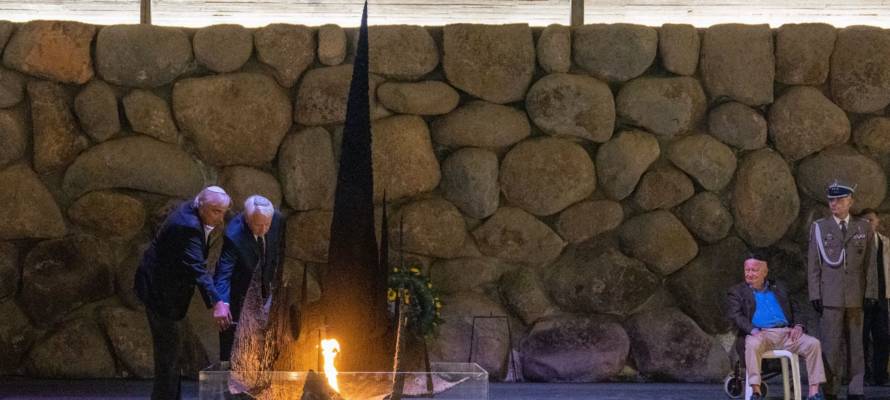Renata Rostborowska and her aunt Kristina Wojwodzka saved Holocaust survivor Stanislaw Shlomo Aronson.
By Gil Tanenbaum/, TPS
Two Polish women, Renata Rostborowska and her aunt Kristina Wojwodzka were posthumously named “Righteous among the Nations” by Yad Vashem, Israel’s national Holocaust memorial and museum. Chairman Danny Dayan and Director of the Yad Vashem Righteous of the World Department, Dr. Yoel Zysenwein, presented the honors at a ceremony held Sunday at Yad Vashem to Rostborovska’s son and Wyvobodzka’s granddaughter in the presence of the Holocaust survivor who the family saved, Stanislaw Shlomo Aronson, his family members, the military attaché at the Polish embassy and other family members and friends of his rescuers.
The Righteous Among the Nations, explains Yad Vashem, are non-Jews honored for taking great risks to save Jews during the Holocaust. Their acts of heroism took many forms and they came from different nations, religions, and walks of life. What they had in common was that they protected their Jewish neighbors at a time when hostility and indifference prevailed.
Persons recognized as a “Righteous Among the Nations” are awarded a specially minted medal bearing their name, a certificate of honor, and the privilege of their names being added to the Wall of Honor in the Garden of the Righteous at Yad Vashem in Jerusalem.
And the story of how these two Polish heroes came to save Stanislav Shlomo Aronson is remarkable in and of itself.
Born in 1925 in Warsaw, Aronson spent most of his childhood years in Lodz, where he lived with his family on the eve of the outbreak of World War II in September 1939.
After the Germans invaded Poland, the Aronson family decided to flee to the east and eventually made it to safety – temporarily – in Lviv, Ukraine, which was then part of the Soviet Union. A few months after the German invasion of the Soviet Union, which began in June 1941, the family members were forced by the German occupiers to move to the Warsaw ghetto. In the fall of 1942, they were put on a freight train and sent to concentration camps.
Stanislav, however, managed to escape from the train and returned to Warsaw where he joined the ranks of the underground under the pseudonym Ryshard Zhurawsky and later changed his name to Zhukovsky.
During this time, he was sworn into the Polish underground organization “Army Kryowa” and only a few of its other members knew that he was Jewish. One of the few who knew was Renata Papenhauser Bernstiren – later Rostborowska – who rented him her apartment to live in, in 1944. By keeping Stanislaw’s secret, Renata not only protected him from being rounded up and executed by the Germans, but she also protected him from other members of the Polish underground who were no lovers of the Jewish people themselves. There were instances during the war where Jews in the underground were killed by their own comrades simply because they were Jews.
Shortly before the outbreak of the Warsaw Uprising, which took place from August 1 to October 2, 1944, Renata gave Stanislaw the address of her Aunt Kristina Wojwodzka’s home in the village of Dalchowice, near Krakow, where he could find refuge if needed.
(The Polish Warsaw uprising against the German occupation during World War II should not be confused with the Warsaw Ghetto Uprising, which took place more than a year before and ended in May 1943 with the Ghetto’s liquidation.)
The Warsaw Uprising was intended to be a coordinated operation in which the remaining Polish underground forces would take control of the City as a diversion while the forces of the Soviet Union would continue their push forward against the remaining German forces in the area. But after the Polish succeeded in their efforts within Warsaw, the Soviet Union’s leader Joseph Stalin cynically held his forces back so that the Germans could wipe out the resistance forces. In this way, Stalin knew, many of the people who would resist Russia’s later occupation of Poland would be eliminated while they themselves weakened the German forces in the fighting.
Given all of this, it was a minor miracle that Stanislaw Shlomo Aronson survived at all and probably would not have without the aid that he received from Renata Rostborowska and her Aunt Kristina Wojwodzka.
Stanislaw took part in the Warsaw Uprising where he was severely wounded. After the fall of its old city, he left Warsaw. He made it to the Wojwodzka estate, where Stanislaw was greeted by Renata and Kristina. They took care of Stanislaw until he recovered from his wounds and he remained there until the arrival of the Red Army.
After the war ended, Stanislaw immigrated to Israel, enlisted in the IDF near the time of its establishment, and fought in several of Israel’s wars. He settled in Tel Aviv, raised a family, and maintains contact with his Polish friends to this day.
